________________
A Hand Book of Jainology
violence to others, uttering falsehood etc. On accounts of this, new sins are committed.
94
PUNYANUBANDHI PAP: Even when papa is emergent, if we carry out spiritual activities, we gather punya (merit).
PAPANUBANDHI PAP: If the jiva commits sins it gathers sinful karmas. When this condition is prevailing, we should be cautious, because we may earn shubh karmas which are stained by the Papanubandhi (that which brings sin). Therefore, we should be cautious to see that dharma is meant only for the attainment of spiritual progress, for carrying out the commandments of the jin, for destroying karmas and fear and for attaining spiritual purification.
DHRUVABANDHI: Even when the jiva reaches the level of a great yogi (a man of lofty spiritual attainments); in other words, even when he is steeped in noble contemplations, some sinful karmas like Jnanavaran may remain in the jiva. Therefore, they are called Dhruva bandhi. Then what is the effect of noble contemplations here? The effect is that the bondage and the degree (Rasa) of the sinful karmas will be very mild. On the contrary, in the state of ignoble contemplations, the bondage of Dhruva bandhi shubh karma does take place but its Rasa will be extremely mild.
Dhruva bandhi means that which always keeps binding upto its proper Gunashanak (place). These are 47 in number. 5 Jnanavaran, 9 Darshanavaran, 5 Antaray, Mithyathva, 16 Kashayas, fear, disgust, the four varnas, Tejas, Karmana, Agurulaghuta, Nirman and Upagath.
Questions:
(1) Explain the nature of Karmabandha and its four kinds. (2) What effects are produced by the eight kinds of Karmas? (3) What is the meaning of Karan? What happens on account of Samkraman? What is Apavartana ?
(4) What is the advantage of noble contemplations? effect do they have on Dhruvbandhi?
Jain Education International
For Private & Personal Use Only
What
www.jainelibrary.org




